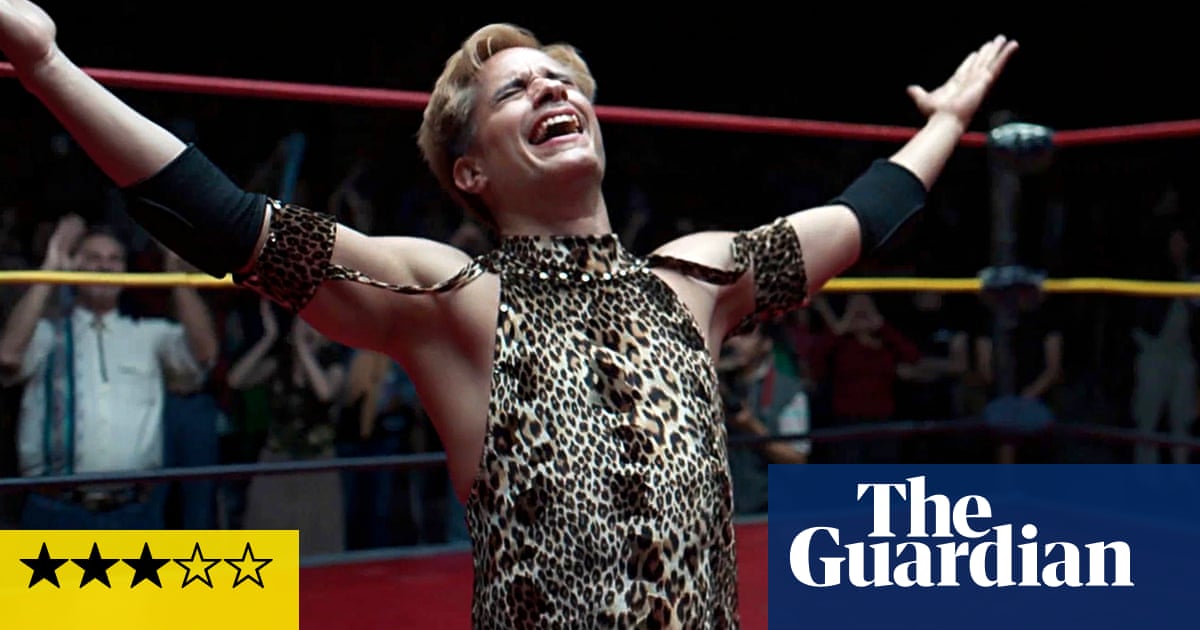
t the start of the century, the director Alfonso Cuarón was casting Y Tu Mamá También, the bawdy but plangent road movie he had written with his brother Carlos about two oversexed Mexican teenagers, the wealthy Tenoch and his poorer, grungier friend Julio. “Alfonso called me very excitedly,” recalls Carlos Cuarón. “He said: ‘I know who’s going to play Julio! I’ve seen him in Alejandro’s movie.’” Alejandro González Iñárritu, that is, whose ferocious dog-fighting drama Amores Perros was about to be released. “I said: ‘No, no, I’ve found Julio; I saw the perfect actor in this short film, De Tripas, Corazón. He’s incredible: his eyes, the way he manages silence ...’”
Eventually, the brothers realised they were talking about the same person: Gael García Bernal, who was then just 21. The son of theatre actors, he had become a star in his early teens on the Mexican soap opera El Abuelo y Yo (Grandpa and I) before decamping to London to study at the Royal Central School of Speech and Drama. Iñárritu plucked him out mid-term for Amores Perros and he stole that movie as the twitchy-hipped tearaway who was every bit as feral as his champion rottweiler. His mutable features could switch from cherubic to lupine to gravely smouldering; his nerve endings felt exposed like frayed electrical wires.
“You can feel all his emotions, all his vulnerability,” says Cuarón. “He fills the screen completely. After my wife met him, she said: ‘Wow, he’s so handsome, but I thought he would be tall.’ He’s like Al Pacino or Dustin Hoffman, the kind of actor whose aura and energy makes you think they’re huge.”
In that wham-bam first half-decade of Bernal’s film career, he gave four killer performances, any one of which would have been enough to build a reputation on: Amores Perros, Y Tu Mamá También, Pedro Almodóvar’s Bad Education, part of which he spent looking ravishing in drag, and The Motorcycle Diaries, in which he played a young Che Guevara. Now 41, Bernal has alternated between mainstream projects in the US – such as his five-year stint as an eccentric conductor in the delightful Amazon series Mozart in the Jungle, or his touching voice work as a balladeer trapped in the afterlife in the Disney/ Pixar gem Coco – and politically charged work in Latin America.
When he calls me today, it is from Mexico City, one of two locations that is home to him (the other is Buenos Aires) and where he happened to be when the lockdown began. “What’s beautiful right now in Mexico,” he says brightly, “is that straight after the daily 7pm press conference, there are films on TV from the golden age of Mexican cinema, from the 1930s to the 1950s. It’s been wonderful to watch them in this light. I see the hopes of the actors and film-makers from 70 or 80 years ago. I see their fears, their experiments, what they were trying to build and express. I find it all incredibly moving as a document of humanity.”
He thinks the current crisis is altering for ever the way we look at art. “There’s something more straightforward now in how we see things – it’s stronger, more elemental and pulsating. We’re so emotionally charged. Artistic expression can affect us for the better, making us feel we’re all in this questioning together.”
It is, he suggests, an ideal state in which to approach Ema, his third film with the Chilean director Pablo Larraín, following No, about the 1988 plebiscite on Pinochet, and the fantasy-biopic Neruda, in which he played a police inspector who doubts his own existence. Ema is the pair’s most challenging collaboration, populated largely by destructive and dislikable characters; only gradually do their prickly exteriors peel away to reveal the wounded souls within. Bernal has the small but pivotal role of Gastón, a choreographer married to the dancer Ema (Mariana Di Girolamo). He is plainly callous – he taunts her over their recent failed adoption of a seven-year-old boy – but Bernal shows that Gastón is suffering, too.
“There is something about the nature of his job that makes him feel very lonely. That was interesting to explore: he’s the centre of gravity at this dance company, he puts everything together, and that leads to a lot of loneliness. It’s like directing a film, which is a solitary pursuit even though it’s collective.” Bernal himself has directed two features – the 2007 drama Déficit and the as-yet-unreleased Chicuarotes, about young Mexican hoodlums – as well as founding, with his childhood friend and Y Tu Mamá También co-star Diego Luna, two production companies and a documentary film festival, Ambulante.
So could Gastón be a portrait of himself or Larraín? “No, not at all!” he laughs. “But Pablo and I both understand him in his isolation and his stupefaction.” Perhaps, then, he is comparable to Rodrigo, the conductor from Mozart in the Jungle, who is also a restless, demanding creative type? “Yes! Except that Rodrigo represents happiness and adventure, whereas Gastón is the opposite. Rodrigo is Maradona. Gastón is more like Mike Tyson.”
His role in Ema is notable for keeping his usual electrifying charm in check; if Gastón is sexual, it is only in the most remote, reptilian way. Such unpalatable parts are rare on Bernal’s CV. In Fernando Meirelles’s Blindness, he played an unscrupulous bartender taking advantage of an epidemic that renders its sufferers sightless; in one scene, he performed a head-waggling, bad-taste version of I Just Called to Say I Love You. And in The King, his English-language debut from 2005, he was a psychopath calmly wreaking revenge on his long-lost father.
“Gael had balls, to be blunt,” says James Marsh, that picture’s British director. “We went to quite a few up-and-coming young American actors, some of whom have big careers now, and none of them would go near that script. But Gael liked the idea of playing someone with this cold surface. I love way he moves in the film: he’s always slinking around, more animal than human. The character has pure evil in him, but he played it in this blank way so that you didn’t hate him.”
Nor, by the end of Larraín’s picture, do we hate Gastón. Whether we understand him is another matter, one that Bernal thinks may not be so important. “That’s always the dilemma, right? Understanding. What the hell does it mean? There is that saying. I think it was Picasso, no? Someone said they didn’t understand his work. So he asked them: ‘You like eating eggs in the morning? You like your huevos rotos?’ ‘Yeah, I like them.’ ‘OK. But do you understand them?’” He chuckles at that.
It is better, he says, for the audience to “know that they don’t know” the character’s motivations. “That’s the journey you embark on when you’re building a character. Little by little, the pieces come together. OK, how would this character feel in the rain? What would he do outside? And you start to discover them. Playing Rodrigo in Mozart in the Jungle, there came a point where I could improvise a whole day of his life. I had that ownership of what he would do in any situation. That’s the nirvana of acting: being able to go into places where you’re not sure what the hell is going to happen.”
Saffron Burrows, one of Bernal’s co-stars on Mozart in the Jungle, witnessed his process up close. “There’s this incredible ease about Gael,” she tells me. “One thing that was so enjoyable was his improvising, the little riffs he developed, the surprises. Every take was very different. I think he works far harder than one would imagine. Sometimes we’d be doing the same scene for nine hours and I’d see him mulling, working stuff out, honing it.” She and Bernal go way back: they starred together as honeymooners in David Nicholls’s short play Aftersun, staged at the Old Vic in 2005.
Burrows even recalls frequenting the bar where he worked while he was a drama student in the late 90s. “I used to go bobbing about with friends at this Cuban place in Islington where he was the barman. He’s had that London training and he’s always carried this internationalism about him. He’s very welcoming. When we were making Mozart, he was always at the helm, always being the host.”
Although necessarily remote as Gastón, he does get to reveal the character’s churning inner turmoil during a frantic speech railing against his wife’s lifestyle. “There are some opinions he has which I share,” Bernal says. “When he mocks the idea of going to Los Angeles and taking selfies, for instance. I would say there is no bigger treason for humankind. It’s throwing your life away. I know it sounds horrible. But going to Los Angeles and taking selfies serves absolutely no transcendent purpose!”
Bernal resisted that city’s siren call even before he and his former partner, the Argentine actor Dolores Fonzi, had two children: a son, Lázaro, now 11, and a daughter, Libertad, who is nine. He stayed put. “Not because I didn’t want to take selfies! There are just so many stories I wanted to tell. I wanted to change things with my own hands, not follow someone else’s route.”
Marsh thinks that Bernal’s integrity is vital to his acting. “I have enormous respect for him and how he refused to take the easy path. He could easily have gone to Hollywood and become Antonio Banderas, but he didn’t. He’s stretched himself and matured into a great artist.” Cuarón, who went on to direct Bernal and Luna in the football saga Rudo y Cursi, agrees. “Gael and Diego are the most respected actors of their generation in Mexico. He’s involved with social issues like immigration, and he’s very outspoken politically. He is both criticised and celebrated, depending on who is in government here. And though he has lived everywhere, he has never left Mexico or stopped being involved in Mexican issues.”
Even noble, conscientious actors are only human. Has he ever taken any roles purely for the money? “Oh, there have been one or two,” the actor says ruefully. I invite him to name and shame them, but he declines with a giggle: “Noooo!” So let’s just say it is oddly comforting that even a performer as good as he is can still make films as poor as Letters to Juliet, where he played Amanda Seyfried’s insufferable boyfriend, or A Little Bit of Heaven, in which he was an oncologist who falls for Kate Hudson as she dies photogenically and at great length.
“I did certain projects I wasn’t too sure of,” he admits. “Sometimes there would be a pleasant surprise, sometimes a very bad one where I’d think: ‘It’s not worth it, man. What am I doing?’ If this pandemic has made me learn one thing, it is that I have to work less. I need to nurture and have something to say.”
So he’s not going to do another film he doesn’t believe in? “I think so, yeah. It’s a commonplace thing to say. But now, thanks to this situation, it’s even more acute, right? I’m just going to do what I like. I’m going to be stricter about that from now on.”
Ema is available on free preview on 1 May, and then normally on Mubi from 2 May












